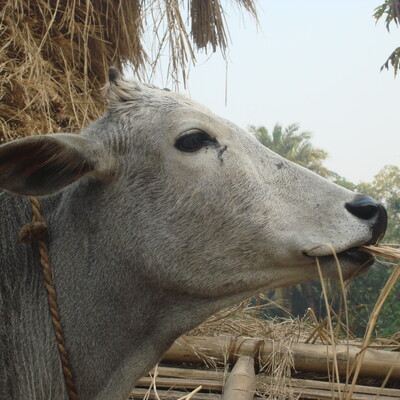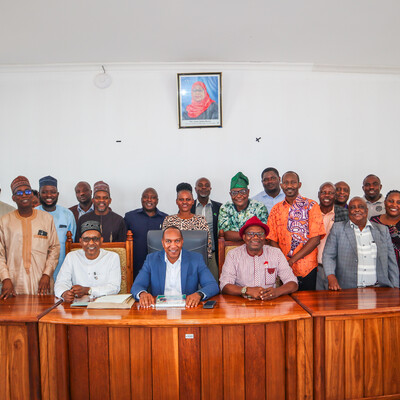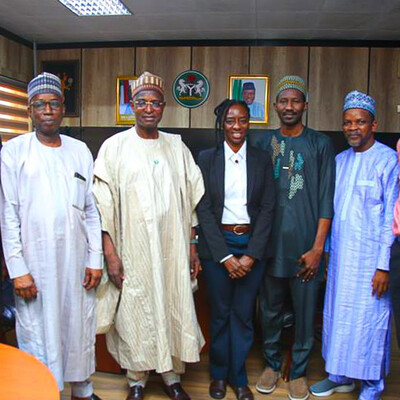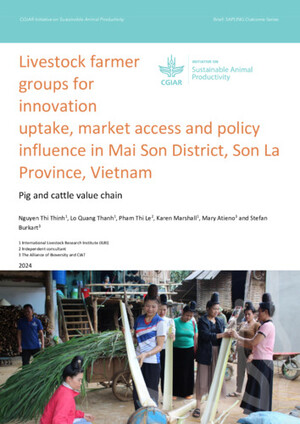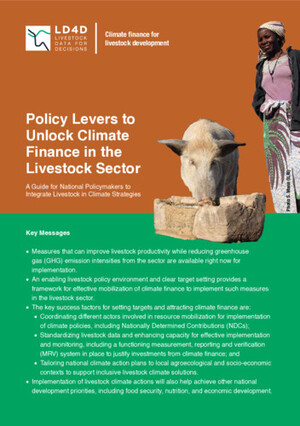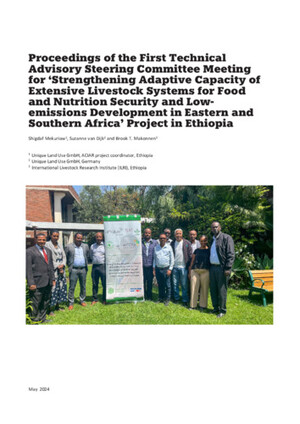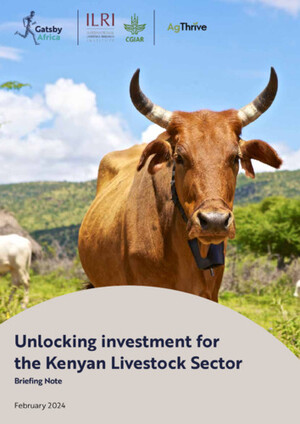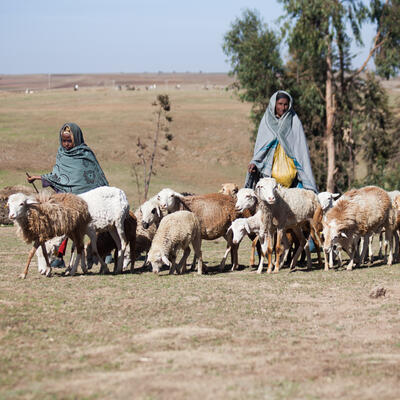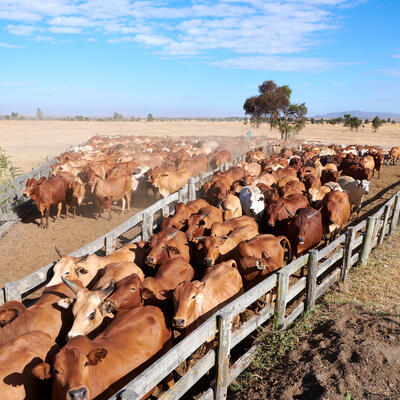
Delia Grace wins Arrell Global Food Innovation Award for Research
On 9 Jun 2022, the Arrell Food Institute of Canada’s University of Guelph awarded veterinary epidemiologist Delia Grace the 2022 Arrell Global Food Innovation Award for Research Innovation. Presented in Toronto during the 5th Arrell Food Summit, on the ‘Future of Food’, the award comes with a CAD100,000 cash prize. Delia Grace is a contributing scientist at the International Livestock Research Institute (ILRI), in Kenya, and professor of food safety systems at the Natural Resources Institute (NRI), University of Greenwich, in the UK.

Delia Grace has produced more than 300 scientific publications, which are notable for their quality as well as their number. Working at the intersection of veterinary, agriculture and food systems, Delia is a recognized global leader in livestock-related food safety, One Health and zoonotic disease issues. Her ground-breaking research has advanced understanding of human diseases spread from animals and the roles of animal-sourced foods in nutrition and was first to identify the heretofore unrecognized but enormous burden of diseases among poor people that are caused by consumption of contaminated foods.
The 9 Jun 2022 award event included a 40-minute presentation by Delia about her journey of several decades to provide an understanding of foodborne disease and how best to manage it. (Scroll down to the bottom of this article to view Delia's livestreamed presentation and following discussion.)
Delia’s work has raised the formerly neglected (‘Cinderella’) issue of food safety in developing countries to the prominence it is afforded today. Her work applies participatory Eco-Health and One Health approaches that must be employed if we are to make progress in addressing the world’s most complex and severe food security issues. A veterinarian and epidemiologist by training, her research teams have employed methodologies spanning community-based approaches at the village level to the analysis of global data.
As noted by the several experts that supported Delia’s nomination for this award, some of which are excerpted below (lightly edited for clarity and brevity), it is difficult if not impossible to do justice to large Delia's body of work, multitude of productive partnerships and many impacts on real-world change. The quantity and quality of Delia’s work can perhaps best be assessed by reviewing a selection of her publications (find below links to just a few examples of her notable works).

Nomination comments from Jimmy Smith, ILRI Director General:
‘Following 5 years as a practicing vet and 5 years working with non-governmental development organizations, over a relatively short period of some 15 years of her international research career, Delia has become a global leader in food safety issues and improved control of emerging and other zoonotic diseases, all with a focus on providing practical, evidenced-based approaches and ways forward suiting the developing world, where the context, and thus options for problem-solving, are so very different from those in the developed world.
‘Delia has an uncanny ability to sift through vast science literature and results to focus on what matters most, to explicate why, and then to articulate that powerfully and concisely for readers of all kinds—from eminent scientists to research leaders to communications staff to lay publics, all of whom receive her careful and respectful attention.'
In my 40-odd years of research and research management, I have found few her equal in eloquently getting to the heart of complex science matters to advance human development.

From Cate Dewey, University of Guelph:
‘Delia appears to have solved the perennial puzzle of how to “close the loop”—to successfully see field research findings go on to inform meaningful behaviour change and to influence health and nutrition policy.'
At each step of the research she not only disseminates knowledge but also measures the impact of knowledge translation and transfer.
From Brian Perry, ILRI and Oxford and Edinburgh universities:
‘Delia is an extraordinary scientist, and extraordinary in many different ways. To say she uses her active mind in a creative and innovative way would be a gross understatement. She thinks fast, she thinks on her feet, and she strays “out of the box” in almost every sentence. . . .
Probably the most exciting scientist I have ever collaborated with.
‘But it is what she has done with these unique personal skills that is so impressive.'

From Michael Taylor, Meridian Institute, Stop Foodborne Illness and former U.S. Food and Drug Administration:
‘Delia is the pre-eminent thought leader in sub-Saharan Africa on food safety and how properly managed animal agriculture can help meet the food security and nutrition needs of African consumers.
I know no other person who has had more impact in improving food safety in Africa.
'She is fearless (she challenges the status quo with a unique blend of force and diplomacy) and her generosity of spirit and uniquely integrative approach to research are as uncommon as they are exemplary.
'Delia stands on the most solid of research foundations but then engages everyone around her in a spirit of collaboration that is empowering of all.'

From John McDermott, former research director at ILRI and the CGIAR Research Program on Agriculture for Nutrition and Health
‘Delia has been at the forefront of research on risk-based approaches to mitigating the substantial food safety risks in informal markets across Africa and Asia.
'Among the research methods she has adapted and combined are classic epidemiological surveys and modelling, risk analysis, participatory research approaches, and socio-economic research on gender and equity and basic cost-effectiveness/benefit analysis.
Delia has played a ‘Hans Rosling’ like role in bringing unappreciated developing country evidence on food safety and One Health to governments, international organizations and development donors.
'The body of research evidence being generated by Delia and her teams is critical to guiding current and future decisions about the development of informal and formalizing markets for perishable foods in low- and middle-income countries with rapidly transforming food systems.
Delia has developed and mentored a great research team of young researchers. Everybody wants to work with Delia, from students to established international researcher leaders.
'Delia’s passion is grounded in a commitment to the ultimate beneficiaries of the research. She understands the perspectives of local consumers, informal butchers, milk hawkers and farmers and she can link their stories with her research.'
Because of her passion for equity, Delia brings a healthy disrespect for expert solutions that fail to critically evaluate assumptions and evidence of their impacts on the poor.

Photos (top to bottom): ➤ Delia at a trypanosomiais control workshop in Bamako, Mali (ILRI/Stevie Mann) ➤ Delia at food safety workshop meetings in Nairobi, Kenya, and Guwahati, Assam, India (ILRI/Susan MacMillan) ➤ Delia making keynote presentations at major conferences of the World Health Organisation and the Food and Agriculture Organization of the United Nations (WHO/Pierre Albouy and FAO/Giulio Napolitano) ➤ Delia doing field research in central Mali (ILRI/Stevie Mann) ➤ Delia consulting informal street milk vendors in Guwahati, Assam, India (ILRI/Susan MacMillan) ➤ Delia standing with her husband, Tom Randolph, then director of the CGIAR Research Program on Livestock, at a ceremony in Uppsala, Sweden, where he was bestowed an honorary doctorate by the Swedish University of Agricultural Sciences (Jenny Svennås-Gillner/SLU) and Delia making a presentation at a science policy forum of the United Nations Environment Assembly (photo credit: ILRI/Susan MacMillan).
Selected Delia Grace publications
http://hdl.handle.net/10568/108972
Co-edited by Delia, this intensively referenced 790-page volume provides the first evidence-based global estimates of the many scientific, economic, policy, and capacity development impacts of livestock research in and for developing countries. It is an indispensable guide and reference for veterinarians, animal and forage scientists, and anyone working for the equitable and sustainable development of the world's poorer agricultural economies. The scientific and economic impacts of tropical livestock research detailed in this work reveal valuable lessons for reducing world hunger, poverty and environmental degradation.
http://hdl.handle.net/10568/108707
Delia was lead author of this seminal evidence-based assessment report on the risk of future zoonotic outbreaks, filling critical knowledge gaps and providing policymakers with a better understanding of the context and nature of potential future zoonotic disease outbreaks.
http://hdl.handle.net/10568/92907
Delia led this collaborative study by ILRI and the UK's leading think tank Chatham House. The study brings together nutrition, food safety and sustainable diets. It shows how animal source foods can contribute to reducing the enormous burden of childhood stunting without compromising other sustainability objectives and what would be needed for this to happen.
http://hdl.handle.net/10568/42438
Delia co-edited the first, and so far only, book to focus on food safety in informal markets in Africa. Foodborne disease in developing countries imposes a health burden comparable to that of malaria, HIV-AIDS or tuberculosis yet only receives a fraction of the attention and investment. Most of this disease is due to fresh food sold in traditional markets. This book, drawing on a wide range of case studies from projects led by Delia, sets out both the problem and solutions. In particular, it emphasizes the participatory, multi-sectoral, people-first approach Delia’s team has used in dozens of food safety projects and which she believes are essential for meaningful change.
http://hdl.handle.net/10568/21161
Led by Delia, this seminal report present data and expert knowledge on poverty and zoonoses hotspots to inform prioritization of study areas on the transmission of disease in emerging livestock systems in the developing world, where prevention of zoonotic disease might bring greatest benefit to poor people.
This memorable short video narrated by Delia summarizes the importance of food safety for poor consumers and farmers in developing countries and what research can do to help.
http://hdl.handle.net/10568/123
This paper co-authored by Delia provides a conceptual framework and review for understanding the intersections between animal disease and development. Delia developed the ‘three trajectory’ conceptual framework which has been used in subsequent analyses including a paper in PNAS (Perry, Grace, Sones, 2011) and Animal (Perry, Robinson, Grace, 2018).
http://hdl.handle.net/10568/846
The use of antimicrobial drugs in agriculture has been linked with the emergence of resistant pathogens, an enormous threat to people and animals. Delia led development of a new approach to improving drug use among farmers. This was based on participatory learning, harm reduction, and information provision. It was evaluated by the first randomized controlled trial to assess an antimicrobial intervention with farmers in developing countries. The intervention was proven to improve health outcomes, drug use and farmer knowledge while being both acceptable and affordable.






